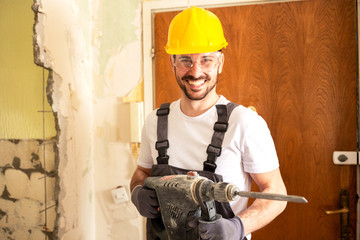Home » Posts tagged 'Masons'
Tag Archives: Masons
Masonry Repair
Masonry repair is an important maintenance process for masonry structures. Masonry Charleston SC can include replacing problem bricks or stones with new ones and repairing small cracks in the mortar. It can also involve tuckpointing the mortar between bricks to strengthen the bond. This is particularly common in historic masonry construction.

When bricks and mortar crack, they can look unsightly, but they are also signs that the masonry is in need of repair. Cracks allow water to get into your wall and cause damage over time. When this happens, you could grow mold or rot in your home. It is essential to have the problem addressed by a professional to prevent further damage and keep your home safe.
Typically, the cracks develop along the joints of your brick walls. They can be caused by expanding/contracting soil or the movement of your foundation. To repair a cracked mortar joint, you will need to clean out the old mortar and apply new. You can buy contractor-grade mortar at a home improvement store. Mix it according to the instructions on the bag.
Whether you have one crack in the bricks or you’re looking at a whole wall of them, they can be an issue. It’s worth examining them carefully and calling in an expert for repair.
In some cases, cracked bricks do indicate an underlying foundation problem. However, they can also be a result of the natural expansion and contraction that occurs with brick walls.
Masons know how to properly seal and fill gaps in masonry to prevent brick expansion. This helps to prevent future problems with settling and environmental damage from occurring.
For smaller passive cracks, a tube of clear silicone sealant is usually a good fix. Put the sealant in a caulking tube, then squeeze it into the crack.
For larger cracks, a flexible backer bar and masonry sealant is the best solution. These can be colored to match the rest of the bricks for a more durable and invisible repair.
Brick walls are susceptible to a range of cracking issues. These can range from cosmetic to structural.
Generally, the type of crack will help you to determine the best way to repair the damage. For example, vertical or stepped cracks are often indicative of foundation problems such as subsidence.
Expansive cracks can occur when materials shrink and expand with changes in temperature or moisture content. They can also occur due to differential movement between different types of masonry.
In concrete masonry, drying shrinkage is a common cause of cracking because the cementitious-coated aggregate matrix expands and contracts as moisture content changes. Other causes include temperature fluctuations and carbonation. Regardless of the cause, concrete masonry cracks can be controlled by incorporating slip planes, horizontal reinforcement or more frequent control joints.
Cracked chimneys can be an expensive and time-consuming fix. That’s why it’s best to fix them sooner rather than later.
Cracks in the masonry allow gases and moisture to escape. They also decrease the heat-efficiency of your fireplace, wood stove or furnace.
Many new chimneys are built with steel rods in the mortar to help them resist strong wind damage. But it is the strong winds themselves that are a big cause of these cracks and if they get bad enough they can even destroy your chimney completely!
Fortunately there are many ways to repair these problems.
If it is a small crack it can be filled in with caulk or concrete bonding material. For larger cracks it is better to consult a professional and have them repaired by a reputable mason.
Another major area where cracks can occur is at the joint between the chimney flue lining and the crown-the concrete cap that covers the top of your chimney. Water that enters this gap can damage your home.
Masonry Expert can repair the problem with a urethane or epoxy injection to fill in the crack, or by installing an expansion joint to take the natural stress of expansion off the corner. If the deterioration is more extensive, a more extensive repair may be required, such as replacing the bricks or the mortar. Other causes for mortar deterioration include abrasion from traffic and excessive vibrations caused by railroad tracks, highways or other high traffic areas. Burrowing insects like wasps, ants, and bees can also attack weakened walls by entering through small cracks in the mortar.